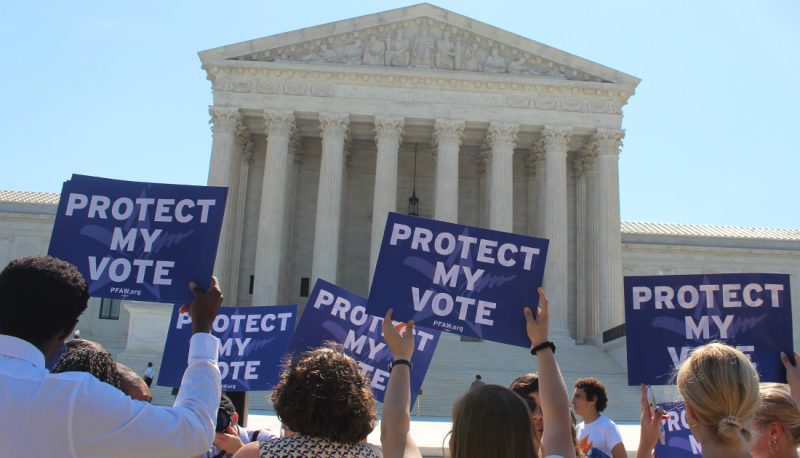“Confirmed Judges, Confirmed Fears” is a blog series documenting the harmful impact of President Trump’s judges on Americans’ rights and liberties. Cases in the series can be found by issue and by judge at this link.
Trump Eighth Circuit judge Steven Grasz cast the deciding vote to disrupt the counting of absentee ballots in Minnesota by ordering that ballots received after Election Day be set aside so that they can be disqualified by a later court order. This was despite the fact that Minnesota absentee voters had already received instructions that their ballots would be counted if received up to a week after Election Day pursuant to a state court order. The October 29 2020 decision, five days before Election Day, was in Carson v. Simon.
Prior to the Minnesota primary, the Alliance for Retired Americans Education Fund filed suit in state court in Minnesota, contending that the state deadline that absentee ballots mut be received by election officials by the day of the election would disenfranchise many voters, particularly because of the COVID-19 pandemic. The claim concerning the primary was settled by a consent decree with the Secretary of State and entered by the state court, which allowed absentee ballots to be received up to two days after the date of the primary. The decree was implemented without problems.
The lawsuit continued with respect to the general election, and a consent decree was entered in early August that allowed absentee ballots postmarked by Election Day to be counted if they arrive within a week thereafter. The state legislature did not object. The Republican Party and the Trump campaign had intervened in the suit and initially appealed the decree, but then dropped their appeal. The state proceeded to put guidance inside each absentee ballot mailing to voters, explaining that ballots must be postmarked by Election Day but would be counted if received up to a week thereafter,
Later in August, two individuals who sought to become Republican electors if Trump won the election in Minnesota filed a separate lawsuit in federal court. They claimed that the state court order violated the federal Constitution and should be stopped. The district court dismissed the lawsuit, finding that the two Republicans did not have standing. They appealed.
In a 2-1 decision issued on the night of October 29, in which Trump judge Grasz was the deciding vote, the Eighth Circuit reversed. The majority held that the Republicans did have standing because they were candidates for office who could be harmed if there was an “inaccurate vote tally” because absentee ballots received after Election Day were improperly counted.
Rather than sending the case back to the district court, the majority went on to determine for itself that a preliminary injunction should be granted for the Republicans. The majority maintained that the Republicans were likely to prevail on their claim that the state court order violates the federal Constitution’s provision that the manner of selecting presidential electors belongs “exclusively” to the state legislature, which had not enacted any extension of the Election Day deadline. Even though it was less than a week before the election, the majority continued, it would be “[b]etter” to put voters “on notice now” about the problems it saw with ballots received after Election Day so they could “adjust their plans”” for casting their ballots. The majority directed the lower court to enter an injunction that required election officials to “segregate” all absentee ballots received after Election Day so that their votes for presidential electors could be “removed from vote totals” if a court finds them invalid, as it suggested was the case.
Judge Jane Kelly strongly dissented. Initially, she pointed out, it was questionable whether the two Republicans had standing. They were not really candidates who themselves ran for public office, she explained, but would “automatically assume” the office of elector if enough people voted for Trump. In addition, their alleged “injury”– a concern about an “inaccurate vote tally” – was “’precisely the kind of undifferentiated, generalized grievance about the conduct of government’” that the Supreme Court has “long considered inadequate for standing.”
Even assuming the Republicans had standing, Judge Kelly wrote, the majority neglected the fact that the state legislature had “expressly delegated” some of its lawmaking authority to the Secretary “where elections are concerned,” and that as a result of the state court’s order, the Secretary was authorized to implement “alternative election procedures” as he did. She also noted that the legislature had expressed “no opposition to the decree or its extension of the deadline for absentee voters.”
Finally, Judge Kelly went on, the majority’s “novel injunctive relief” will harm Minnesota voters and the state, particularly because it will “cause voter confusion and undermine Minnesotans’ confidence in the election process” as they search for ways at the last minute to help ensure that their votes will count. In fact, she noted that “almost 580,000 Minnesota voters” had not yet returned absentee ballots as of October 23. The majority’s ruling, she concluded, clearly violates the Supreme Court’s warning that lower federal courts should not generally “alter the election rules on the eve of an election” where voter confusion and similar problems will result.
Because of Trump judge Grasz’s deciding vote, however, that is exactly what will happen in Minnesota, threatening the rights of hundreds of thousands of Minnesota voters. The case is yet another example of a Trump judicial appointee making it harder for Americans to vote in this election.

